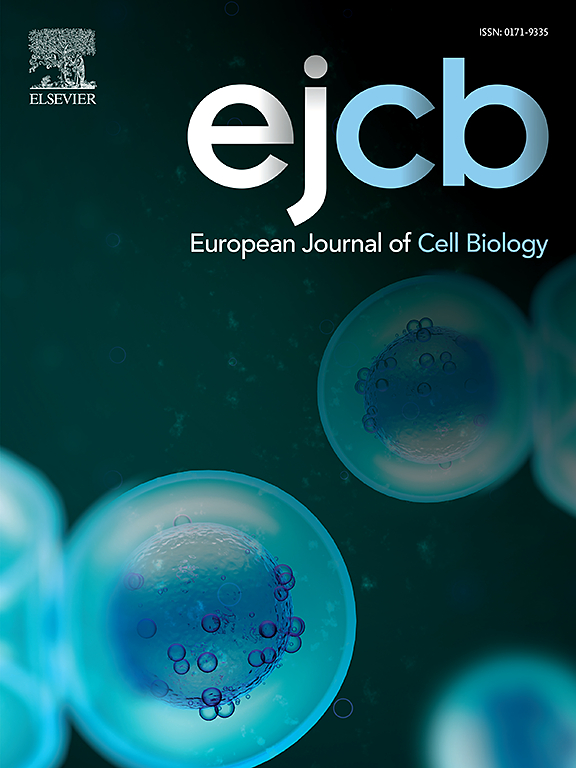PSTPIP1 and pyrin, two key regulators of macrophage differentiation
IF 4.3
3区 生物学
Q2 CELL BIOLOGY
引用次数: 0
Abstract
Background
Monocytes develop from hematopoietic stem cells; migrate into the tissue, where they undergo a stimulation-dependent and tissue specific differentiation into macrophages imprinting specific inflammatory functions. The development of inflammatory functions during differentiation of progenitor cells into macrophages remained incompletely understood.
Objective
We intended to identify regulatory factors driving monocyte/macrophage differentiation.
Methods
A Genome-wide CRISPR/Cas9 knockout screen (GeCKO) in ER-HoxB8 macrophages was used to identify key drivers of macrophage differentiation which were verified in independent knock-out and knock-in cells. Immunophenotyping was studied by FACS, morphology and migration by fluorescence microscopy, the inflammatory response by ELISA. Transcriptomic data were obtained by next generation mRNA sequencing and validated by quantitative polymerase chain reaction and immunoblotting.
Results
Genome-wide CRISPR/Cas9 knockout screen identified the cytosolic cytoskeleton-associated adaptor molecule PSTPIP1 (proline-serine-threonine phosphatase interacting protein 1) as a regulatory factor of macrophage differentiation. Interestingly, mutations in PSTPIP1 cause autoinflammatory disorders (PAPA syndrome). Deletion of PSTPIP1 resulted in hampered differentiation, decreased inflammatory response, changed morphology, altered cell adhesion and migration properties. PSTPIP1 is a regulator of Pyrin inflammasome activity which drives autoinflammation in familial Mediterranean fever (FMF). Deletion of Pyrin also resulted in a strong alteration of cellular dynamics in macrophages.
Conclusion
PSTPIP1 and Pyrin are crucial factors in macrophage differentiation. Their deletion or mutation resulted in a hampered differentiation of macrophages resulting in strong morphological alterations and impacting phagocyte key functions as adhesion and migration. Impaired differentiation of macrophages may represent a significant factor in the pathophysiology of autoinflammatory diseases like FMF and PAPA.
PSTPIP1和pyrin,巨噬细胞分化的两个关键调节因子
单核细胞由造血干细胞发育而来;迁移到组织中,在那里它们经历刺激依赖性和组织特异性分化为巨噬细胞,印记特定的炎症功能。祖细胞向巨噬细胞分化过程中炎症功能的发展尚不完全清楚。目的研究单核/巨噬细胞分化的调控因子。方法利用ER-HoxB8巨噬细胞的全基因组CRISPR/Cas9敲除筛选(GeCKO),鉴定巨噬细胞分化的关键驱动因素,并在独立敲除和敲入细胞中进行验证。采用流式细胞仪(FACS)进行免疫分型,荧光显微镜观察形态学和迁移,ELISA检测炎症反应。转录组学数据通过下一代mRNA测序获得,并通过定量聚合酶链反应和免疫印迹验证。结果全基因组CRISPR/Cas9基因敲除筛选发现细胞质细胞骨架相关接头分子PSTPIP1(脯氨酸-丝氨酸-苏氨酸磷酸酶相互作用蛋白1)是巨噬细胞分化的调节因子。有趣的是,PSTPIP1的突变会导致自身炎症性疾病(PAPA综合征)。ppstpip1的缺失导致分化受阻,炎症反应降低,形态学改变,细胞粘附和迁移特性改变。PSTPIP1是家族性地中海热(FMF)中Pyrin炎性小体活性的调节因子,其驱动自身炎症。Pyrin的缺失也导致巨噬细胞细胞动力学的强烈改变。结论pstpip1和Pyrin是巨噬细胞分化的关键因子。它们的缺失或突变导致巨噬细胞分化受阻,导致强烈的形态学改变,影响吞噬细胞的粘附和迁移等关键功能。巨噬细胞分化受损可能是FMF和PAPA等自身炎症性疾病病理生理的重要因素。
本文章由计算机程序翻译,如有差异,请以英文原文为准。
求助全文
约1分钟内获得全文
求助全文
来源期刊

European journal of cell biology
生物-细胞生物学
CiteScore
7.30
自引率
1.50%
发文量
80
审稿时长
38 days
期刊介绍:
The European Journal of Cell Biology, a journal of experimental cell investigation, publishes reviews, original articles and short communications on the structure, function and macromolecular organization of cells and cell components. Contributions focusing on cellular dynamics, motility and differentiation, particularly if related to cellular biochemistry, molecular biology, immunology, neurobiology, and developmental biology are encouraged. Manuscripts describing significant technical advances are also welcome. In addition, papers dealing with biomedical issues of general interest to cell biologists will be published. Contributions addressing cell biological problems in prokaryotes and plants are also welcome.
 求助内容:
求助内容: 应助结果提醒方式:
应助结果提醒方式:


